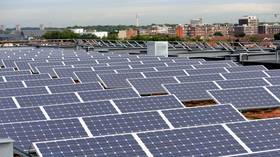EU unveils energy rationing plan

European Commission President Ursula von der Leyen announced on Wednesday that the EU would raise its renewable energy targets and invest billions of euros in clean energy in a bid to break away from Russian oil and gas imports. Consumers will pay a price, however, with the EU’s plan including energy rationing and compulsory solar panels on homes.
Von der Leyen’s ‘REPowerEU’ plan would cut the EU’s reliance on Russian gas by 66% this year and eliminate it entirely by 2027, the bloc’s policy chief told reporters in Brussels.
Under the proposal, the EU would increase its Energy Efficiency Target from 9% to 13%, and raise from 40% to 45% the amount of its power generated by renewables by 2030. At present, the EU sources 22% of its energy from such sources
To achieve this, von der Leyen said that the the bloc would speed up the permit procedure for renewable projects such as wind farms and would make €300 billion ($315 billion) available in grants and loans. Of this funding, 95% would be set aside for green energy, while 5% would be used to upgrade the EU's gas and oil infrastructure to receive imports from sources other than Russia.
However, some of the immediate costs will be borne by consumers. According to the European Commission’s website, households and industry will be required to make “behavioral changes” – such as turning down air conditioning and switching off lights – to reduce demand for oil and gas by 5%. Furthermore, commercial and public buildings will be required to install rooftop solar panels by 2025, with these units to be made mandatory on residential buildings by 2029.
Some individual member states have already asked their citizens to curtail their energy use. Germany, which depends on Russia for more than half of its gas and was already facing the world’s highest energy costs due to its flawed transition to wind power, has asked its population to shower less and swap their cars for bicycles in order to save costs.
With consumers across the EU already grappling with skyrocketing inflation and record fuel prices, Russian President Vladimir Putin said on Tuesday that European countries are committing economic “suicide” by trying to wean themselves off Russian oil and gas, accusing them of caving to pressure “from their American overlord” without “paying any attention to the damage that they have already caused their own economy.”













